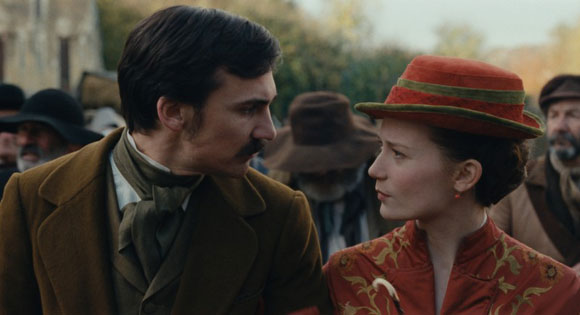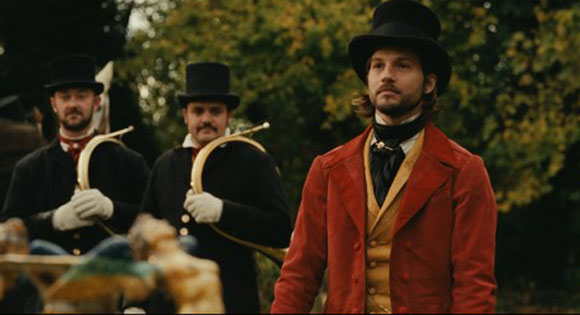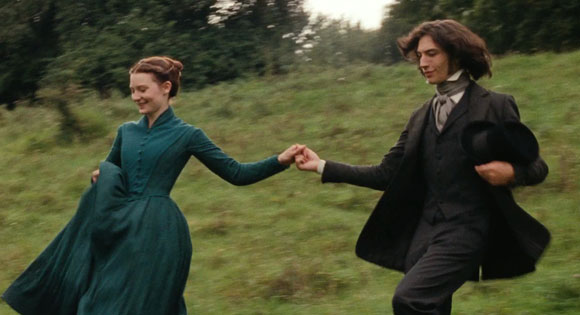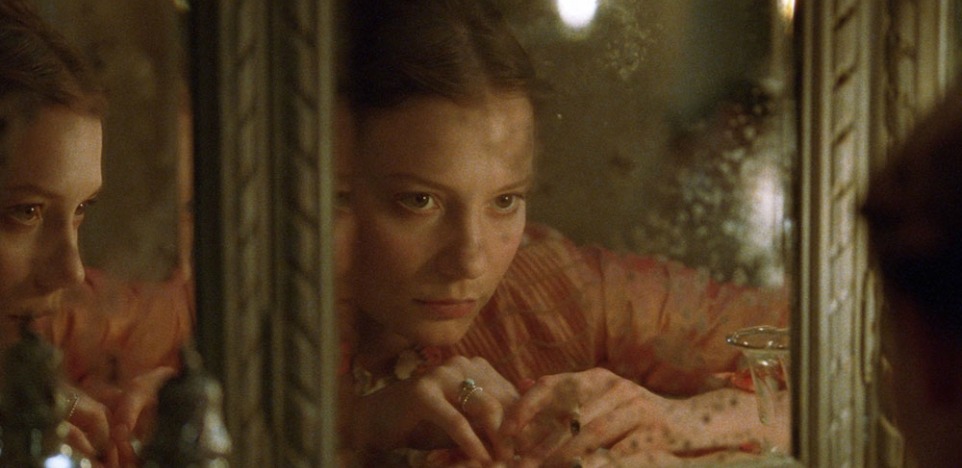"There is no calamity greater than lavish desires."
– Lao Tzu
Emma (Mia Wasikowska), the daughter of a pig farmer (Olivier Gourmet), has high hopes of being a saintly person during her education at a convent, but after these expectations are dashed, she leaves and marries Charles Bovary (Henry Lloyd-Hughes), a country doctor in the small French town of Yonville. He is a good, practical, and patient man who has no interest in sexual passion, status, impressing others, or adventures abroad.

"He who expects much will be disappointed; yet disappointment seldom cures us of expectations."
– Samuel Johnson
It does not take Emma very long to get bored with life in the village. The place strikes her as drab and decrepit, a kind of prison to her. The first person to transport her to another world is Monsieur Lheureux (Rhys Ifans), the local merchant. He's a mesmerizing chap who never fails to praise her beauty. He extends her credit so that she can buy fancy dresses, new silks, and art objects for her house.
"The lust for comfort, that stealthy thing that enters the house a guest, then becomes a host, and then a master."
– Kahlil Gibran
Leon Dupuis (Ezra Miller), a handsome young law student and ardent follower of romanticism, sees in Emma a soulmate and a lover but after she rebuffs him, he leaves to complete his studies. But no matter what other diversions she finds, Emma is consumed by a yearning for sexual passion. She finds it with the Marquis d'Andervilliers (Logan Marshall-Green).

"The more one yields to desire, the more insatiable it will become."
– Mahabharata
Feeling more alive and vibrant than ever, Emma is thrilled when Monsieur Homais (Paul Giamatti), a community leader, convinces her humble husband to do an operation on a clubfooted young man.
She hopes this event will bring fame and good fortune to the town and perhaps result in the offer of a position for her husband in a larger town. But things go poorly and no big changes result.
"Gratification of one desire or one set of desires merely gives rise to - another."
– Ramesh Balscher
When Leon returns to the area, Emma begins a tryst with him, but she is hampered by the huge debt she has built up over the years to Monsieur Lheureux. Emma turns for help to the men who have fed her desires, but they reject her. She becomes determined to find a way out of this nightmare.

"From the deepest desire often ensues the deadliest hate."
– Socrates
Madame Bovary is directed by Sophie Barthes from a screenplay by Barthes and Felipe Marino. It focuses intensely on the life of a woman who is devoured by her desires, high expectations, and disappointments. Mia Waskikowska shows how Emma Bovary sets herself on a self-destructive course when she grows too attached to her fantasies, lust, and romantic ideas and ideals. This screen version of Gustave Flaubert's novel is greatly enhanced by the widescreen imagery of Andrij Parekh and the music by Evgueni and Sacha Galperine.
Going Deeper
In his book Lectures on Literature, Vladimir Nabokov spends some time with Gustave Flaubert's Madame Bovary which he considers a masterpiece as a romantic fairy tale. He defines his terms:
"When discussing Madame Bovary – the book and the lady herself – I shall use the word romantic in the following sense: 'characterized by a dreamy imaginative habit of mind tending to dwell on picturesque possibilities derived mainly from literature.' "
Here is Nabokov's sophisticated assessment of the character of Emma Bovary:
"A romantic person, mentally and emotionally living in the unreal, is profound or shallow depending on the quality of his or her mind. Emma Bovary is intelligent, sensitive, comparatively well-educated, but she has a shallow mind: her charm, beauty, and refinement do not preclude a fatal streak of philistinism in her. Her exotic daydreams do not prevent her from being a small-town bourgeois at heart, clinging to conventional ideas or committing this or that conventional violation of the conventional, adultery being a most conventional way to rise above the conventional; and her passion for luxury does not prevent her from revealing once or twice what Flaubert terms a peasant hardness, a strain of rustic practicality. However, her extraordinary physical charm, her unusual grace, her birdlike, hummingbird-like vivacity – all this is irresistibly attractive and enchanting to three men in the book, her husband and her two successive lovers, both of them heels: Rodolphe, who finds in her a dreamy childish tenderness … and Leon, an ambitious mediocrity, who is flattered by having a real lady for his mistress."
